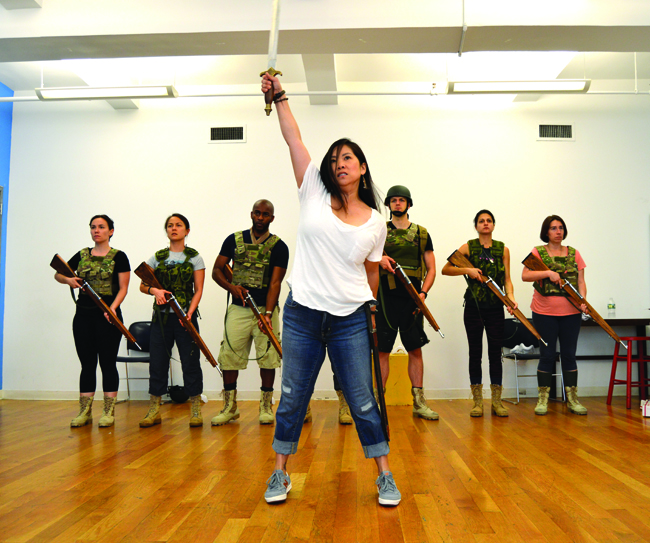 “Bullet Catchers” imagines the US Army’s first mixed gender infantry unit, from training to deployment. | Photo courtesy bulletcatcherstheplay.com.
“Bullet Catchers” imagines the US Army’s first mixed gender infantry unit, from training to deployment. | Photo courtesy bulletcatcherstheplay.com.
BY DUSICA SUE MALESEVIC | It was less than two years ago — December 2015 — that the last barriers barring women from certain combat positions finally fell. Now, the new play “Bullet Catchers” envisions a not-so-distant future where women and men officially serve together in the same infantry unit.
“It’s been a 70-year journey for women to fully integrate into all branches, units, and occupations of the military,” said Lory Manning, who served in the Navy for 25 years, starting in the late 1960s.
For Manning, the armed forces offered a different path at a time where options were limited for women. “I did not want to be a schoolteacher and I wanted out of New Jersey,” she recalled by phone. “The Navy seemed like a good opportunity — for travel especially.”
She explained that it has been a piecemeal process to lift the restrictions. For example, in 1992 women were allowed into combat aviation, said Manning, a fellow at the Service Women’s Action Network, known as SWAN (servicewomen.org). According to the organization’s website, there are “nearly 2.5 million service women in the US.”
The nature of the wars in Iraq and Afghanistan and the sheer number of women deployed during those two conflicts means women (and men) who were not in combat roles saw combat, she said.
Since September 11, 2001, over “300,000 women have deployed to Afghanistan and Iraq,” according to a SWAN report dated Feb. 1, 2017. More than 1,000 women were wounded, and 166 were killed during combat operations, the report noted.
“Now even though they fought in Iraq and Afghanistan they are officially allowed to fight,” Manning said.
 During 2016’s research process, the cast and creative team of “Bullet Catchers” met with active duty personnel at Fort Dix. | Photo courtesy bulletcatcherstheplay.com.
During 2016’s research process, the cast and creative team of “Bullet Catchers” met with active duty personnel at Fort Dix. | Photo courtesy bulletcatcherstheplay.com.
Sandra W. Lee, who plays two roles in “Bullet Catchers,” saw combat in Iraq although she was assigned to civil affairs, she told NYC Community News in a phone interview. Lee joined the army in response to 9/11, she said, and served from 2002 to 2010.
Civil affairs focuses broadly on rebuilding a country’s infrastructure, and in Iraq, Lee explained she worked on rebuilding schools. Her unit did train in combat, and Lee said she went along with another division as they conducted security sweeps and raids, and looked for weapons caches.
“We would fill in a lot,” she recalled. “We did a lot of missions that were not part of our job description. But being a solider, that is in the job description.”
Lee, who was in Iraq from 2003 to 2004, said that while driving in the country, her convoy was hit four different times by roadside bombs. She said she has a brain injury that stems from those incidents. She was also diagnosed with post-traumatic stress disorder, known as PSTD. Lee said she was raped by another solider during her deployment.
Her experiences inform how she plays Até, which in the play is the goddess of war and a warrior. Being a woman in the military, Lee explained, there is a perception that females are not good enough and “you have to prove yourself in order to join their ranks.”
Due to her brain injury, Lee was somewhat apprehensive about contributing to the writing of the play but said she put her voice into Até, whose character was a “shell” when she joined the production last December. “The nice thing about this process… it was a group effort,” she said.
Indeed, the co-creators of “Bullet Catchers,” Maggie Moore and Julia Sears, sought input from the actors for the play, which was a collaborative endeavor. “It felt like a writer’s room for a lot of the process,” Sears, who is also the play’s director, said by phone.
The actors were given writing assignments, Sears said, such as writing the fairytale version of their character’s arc in the play, or being challenged to write five minutes of theater within a half hour. “They have so much ownership over what they’re making,” Sears said.
Moore and Sears were the final editors but the actors had a part in shaping their characters, like Lee with Até. Moore, who is also the play’s associate director, said the actors found their voices as writers. While Moore and Sears were honored to be the leaders, she said, the play belongs to the collective. “We all jumped off the cliff together,” Moore said by phone.
Neither Moore nor Sears served in the military. The genesis of the project stems from when Moore was working at the Washington, DC-based Truman National Security Project in early 2015, she explained (trumanproject.org; “a nationwide community, forged in the aftermath of 9/11, fighting for America’s promise on the battlefield, along the campaign trail, and in the halls of government”). Sears and Moore have been friends since college, and followed the news of whether the last restrictions on combat positions would be lifted. Sears thought the story of women fighting for recognition in combat would be an excellent story, Moore said.
Sears and Moore interviewed 35 veterans and current service members — an about even mix of women and men. The veterans had fought in Vietnam, Iraq, and Afghanistan, Sears said. The interview process took about three months, Sears said, with Moore and her then listening and transcribing the interviews. From there, they started to narrow down stories and characters, Sears said.
 The cast during a recent rehearsal. | Photo courtesy bulletcatcherstheplay.com.
The cast during a recent rehearsal. | Photo courtesy bulletcatcherstheplay.com.
A bullet catcher is “army slang for an infantryman,” according to the play’s website, and Moore said, “It’s kind of a badge of honor to be a bullet catcher.” Some women are going through infantry training right now, she said, and “we’re seeing the movement towards the world we built in the play becoming a reality.”
“Bullet Catchers” follows the journey of “the first official mixed gender infantry unit in the US Army, from training to deployment,” according to the play’s website. Moore said it was important to highlight a diversity of experience and so the play’s characters run the gamut from private to lieutenant colonel.
Jessica Vera plays Maya de los Santos, who in the play is a lieutenant colonel and the first female commander of a forward operating base, Vera explained by phone. Vera described Maya as a leader, someone who not only sees the opportunity before her, but also the weight of that level of responsibility.
While Vera has no military experience, her father was an Army Ranger, her older brother was in the Army Cavalry, and her younger brother is currently serving in the Air Force. Growing up in a military household has informed how she plays Maya, she said.
One of the play’s first scenes is Maya picking up her wife, Jordan, a civilian, and taking her over the threshold after getting married. Lee, the veteran, also plays Jordan in the play, and said Vera helped to shape Jordan’s character. While the military’s Don’t Ask, Don’t Tell policy has been officially abandoned, Lee said, “There’s still a stigma. It depends on who your command is.”
On the other end of the military spectrum is character Joan Boudica, played by Emma Walton. Joan is a private and is brand new to the experience, Walton explained by phone. Joan is part of the reserves and is randomly picked for special training and is deployed, she said. “It’s a coming of age story for her,” Walton, who has no military experience, said.
Walton said women have been in the military for a long time — flying planes and protecting the country like men are. “We’re excited to show it,” she said. “The rest of America thinks that they’re nurses, they’re doing paperwork. That’s just not true.”
Sears, the director, said she hopes the play spurs a myriad of conversations for the audience, including a larger discussion of women in leadership roles. “We’re hoping that this story — as specific and nuanced [as it is] — can still have reverberations for woman and anyone who has tried to move the needle of gender integration in general,” she said.
Thurs., July 20 through Sat., Aug. 5 (opening night, July 22). At Judson Memorial Church (55 Washington Square South, at Thompson St.). Evening and matinee performance schedule varies. For tickets ($20) and schedule info, visit bulletcatcherstheplay.com. Veterans and active military members can receive discounted rates by sending an email to bulletcatchersboxoffice@gmail.com.































